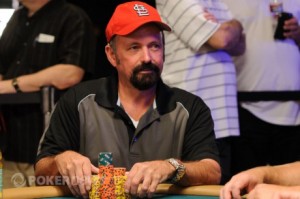I recently played in the $25,500 World Poker Tour main event at the Bellagio, and I can honestly say I played the best four days of poker of my life. I made good folds, good calls and a few good bluffs. I wrote down every hand I played, which I’ll use as coaching material in the future. I busted in 20th place, while 18 people got paid. Going out basically on the bubble is never fun.
Michael Mizrachi, with 500K chips, raised to 27K from middle position at 6K-12K-2K blinds. I, with 400K, picked up A-K in the small blind. Antonio Esfandari was in the big blind with 180K. While I was looking at my cards, I looked to my left and saw Antonio perk up a little bit, which led me to believe he may go all-in if given the opportunity.
So, I decided to call, hoping Antonio would go all-in with whatever he had and I didn’t really mind what Michael did, as I had A-K, which would crush any range he would continue with. I was thrilled to see Antonio instantly go all-in as soon as my chips hit the felt.
I was equally happy to see Michael go all-in, which I thought was clearly an isolation play. I, of course, called. Michael had 
 and Antonio had K-J. I had to fade a Q or a J to end up with a million chips, but a queen came to send me home.
and Antonio had K-J. I had to fade a Q or a J to end up with a million chips, but a queen came to send me home.
When most players bust from a tournament, they usually try to figure out how they could’ve avoided the situation. I try to figure out if I could’ve gained more equity in the hand. Notice in this hand, if I reraised preflop, to say, 70K, Antonio would have almost certainly folded and Michael would’ve called.
I would then have to play a pot out of position against someone who tends to not fold whenever the flop is good for his perceived range or bad for my perceived range, which basically means he would almost certainly play back at me on any board that doesn’t have an ace, king or queen. This means I often will be winning small pots when I hit my ace or king and losing small pots whenever any other flop comes. That isn’t a good thing. I could also reraise large preflop, to something like 100K, but I think that’s a fishy play in general because it will force Michael to fold most hands that don’t have the correct equity to call. Whenever you have your opponent’s range crushed, you almost always want them in the hand. The last thing you want to do is drive them out of the pot when they have something such as A-J because they’re drawing thin. What this boils down to is I did the absolute best I could in this hand and that makes me happy.
I’m sure some of you are thinking, “But you risked going broke on the bubble.” While I did, notice I got all-in with 58 percent equity in a large pot, which certainly would’ve given me a great opportunity to make a really deep run in the tournament. Unless your stack is short, where getting in the money would be a huge success, playing like a super nit to get in the money is rarely a good play. In this event, 18th place paid $40K and first place paid $1.1 million. I would much rather give up a “guaranteed” $40K in exchange for a 1-in-15 shot at $1.1 million.
Sadly, most people can’t or haven’t done the math and believe min-cashing is the way to be profitable at poker. If you look at the players who cash regularly but rarely win, you’ll see they usually are break-even at best. To be a big winner in tournaments, you must put yourself in situations to get a lot of chips late in the tournament. This hand is a great example of how I do this on a regular basis. Sometimes, it just doesn’t work out.
— Jonathan Little is the Season 6 WPT Player of the Year and is a representative for Blue Shark Optics. If you want to learn to play a loose-aggressive style, which will constantly propel you to the top of the leaderboards, check out his poker training website at FloatTheTurn.com.




